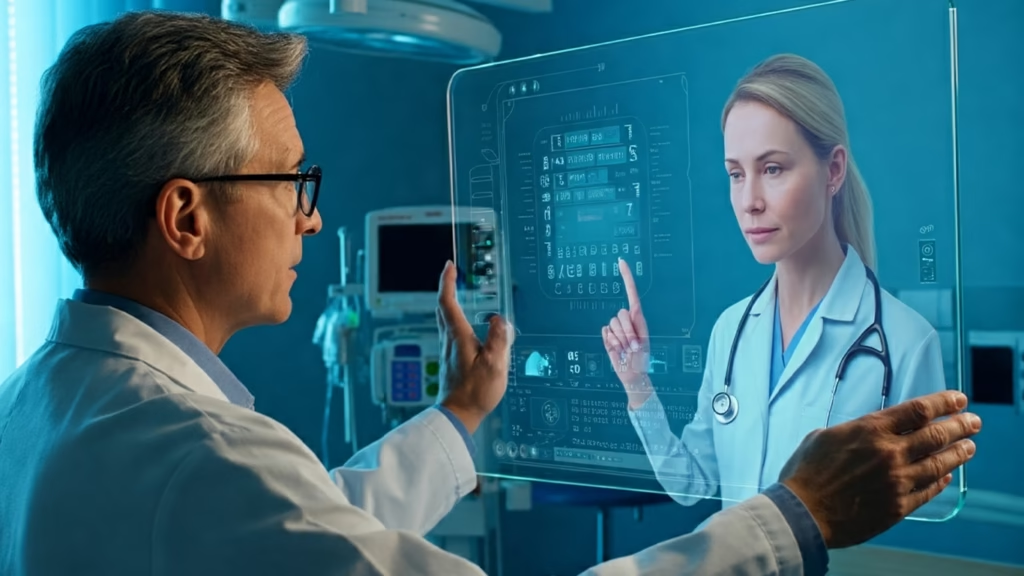New York, USA – Forget waiting weeks for an appointment and hours in the waiting room. The future of healthcare is here, and it’s powered by Artificial Intelligence (AI). Imagine a world where your diagnosis is instant, your treatment is personalized, and your doctor has access to the combined medical knowledge of the entire planet. This isn’t science fiction; it’s the rapidly approaching reality of AI-powered medical diagnosis and treatment.
From AI-powered stethoscopes that can detect heart murmurs with greater accuracy than human ears to robot surgeons performing complex procedures with unparalleled precision, AI is revolutionizing every aspect of healthcare. But how does it work, and what does it mean for the future of medicine?
AI: The Doctor Will See You Now
AI in healthcare leverages complex algorithms and machine learning to analyze vast amounts of medical data, including patient records, clinical research, and medical images. This allows AI systems to:
- Diagnose diseases with increased accuracy: AI can analyze medical images like X-rays, MRIs, and CT scans to detect abnormalities such as tumors or fractures, often with greater accuracy and speed than human doctors.
- Predict patient outcomes: By analyzing patient data, AI can predict the likelihood of disease progression, treatment success, and potential complications. This allows for proactive intervention and personalized treatment plans.
- Accelerate drug discovery: AI can analyze complex biological data to identify potential drug targets and predict the efficacy and safety of new medications, significantly speeding up the drug development process.
- Personalize treatment plans: AI can analyze a patient’s genetic makeup, lifestyle, and medical history to tailor treatment plans to their individual needs, maximizing the chances of successful outcomes.
- Assist in surgery: Robot-assisted surgery, guided by AI, allows for greater precision, smaller incisions, and faster recovery times.
Real-World Applications: AI is Already Changing Lives
The impact of AI in healthcare is already being felt around the world. Here are just a few examples:
- Early detection of diabetic retinopathy: AI-powered systems can analyze retinal images to detect early signs of diabetic retinopathy, a leading cause of blindness, allowing for timely intervention and preventing vision loss.
- Faster and more accurate cancer diagnosis: AI algorithms can analyze pathology slides to identify cancerous cells with greater accuracy and speed than human pathologists, leading to earlier diagnosis and improved treatment outcomes.
- Personalized cancer treatment: AI can analyze a patient’s tumor genetics to identify the most effective chemotherapy drugs and predict their response to treatment, leading to personalized cancer therapy with improved outcomes.
- Mental health support: AI-powered chatbots and virtual assistants can provide mental health support and counseling, increasing access to care and reducing stigma.
The Future of Healthcare: A Collaborative Approach
While AI has the potential to revolutionize healthcare, it’s important to remember that it’s not meant to replace human doctors. Instead, AI is a powerful tool that can augment their capabilities, allowing them to focus on what they do best: providing compassionate care and building relationships with patients.
The future of healthcare lies in a collaborative approach, where AI and human doctors work together to provide the best possible care to patients. This means embracing the potential of AI while ensuring that it is used ethically and responsibly, with a focus on patient safety and privacy.
Challenges and Ethical Considerations
As with any new technology, AI in healthcare presents challenges and ethical considerations that must be addressed. These include:
- Data privacy and security: Protecting patient data is paramount. Robust security measures must be in place to prevent data breaches and ensure patient confidentiality.
- Bias and fairness: AI algorithms are only as good as the data they are trained on. If the data is biased, the AI system may perpetuate those biases, leading to disparities in care.
- Transparency and explainability: It’s important to understand how AI systems arrive at their diagnoses and treatment recommendations. This transparency is crucial for building trust and ensuring accountability.
- Access and equity: AI-powered healthcare should be accessible to everyone, regardless of their socioeconomic status or geographic location. Efforts must be made to ensure equitable access to these technologies.
The Road Ahead: Embracing the AI Revolution in Healthcare
The AI revolution in healthcare is just beginning. As technology continues to advance, we can expect even more innovative applications of AI in medicine. This presents an exciting opportunity to transform healthcare as we know it, improving patient outcomes and creating a healthier future for all.
By embracing the potential of AI while addressing the ethical challenges, we can ensure that this powerful technology is used to its fullest potential, creating a healthcare system that is more efficient, effective, and equitable for everyone.



